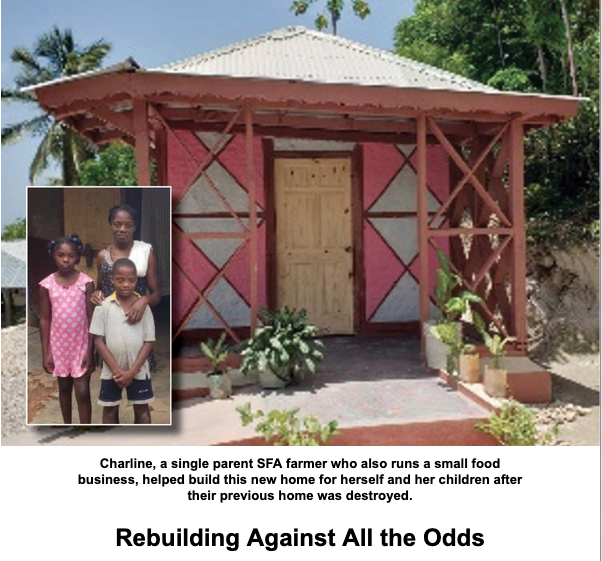We would like to end the year with four stories from the Smallholder Farmers Alliance (SFA) in Haiti that offer hope and suggest possibility from a country under siege. A story of homes rebuilt in the midst of chaos. The story of a loan repaid from beyond the grave. How one tree planted was a stand-in for 11 million others. And the story of a priceless agricultural gift given to the world.
In August of 2021 a severe earthquake caused extensive damage in a southern region of Haiti, and particularly near the quake’s epicenter in Laborde. This farming community is where the SFA has a branch operation, and hundreds of our members were affected. After providing short-term emergency assistance, we partnered with Habitat for Humanity Haiti, with support from the Raising Haiti Foundation, to rebuild 15 farm homes as part of a long-term recovery effort.
From the outset the home rebuilding project turned into an epic saga. Initially there were delays because gangs in Port-au-Prince blocked major road access to the south, making it difficult for trucks to get though with building supplies. Then a national shortage sent the price of fuel skyrocketing just as the trucks were finally able to get through the blockades. This coincided with an overall inflation rate of more than 50%, making building supplies more expensive.
Soon after construction began in May of 2022, riots and demonstrations erupted in the nearby city of Les Cayes where Habitat staff were staying, raising concerns for their safety. SFA farmers and their neighbors who still had homes in good condition in the Laborde area responded by hosting the Habitat staff for several months.
By April of this year all 15 homes were completed. Each house is designed to be earthquake and hurricane resistant, each has a dry pit toilet and a rainwater harvesting system, and each family received one sheep along with tomato and leek seeds to establish a backyard garden. In every case the occupants were trained by Habitat and involved in the home’s construction and are now able to help others in their community.
|
|
|
|
|
|
|
|
|
|
|
|
|
|
|
|
|
|
|




